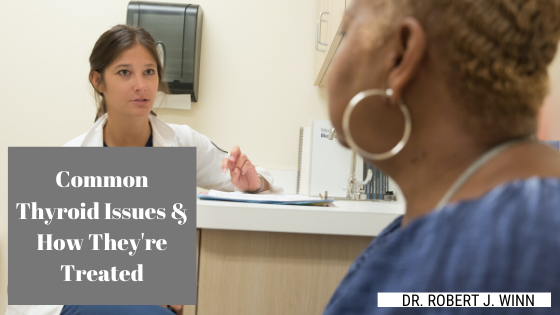An essential part of the endocrine system, the thyroid, which is a gland shaped somewhat like a butterfly and located at the neck’s base beneath the Adam’s apple, manufactures the hormones that work in the regulation of the body’s metabolism. While small, this gland is potent, and different disorders may occur when the thyroid is found producing either too little or too much hormone. The first is hypothyroidism; the latter is hyperthyroidism. Researchers estimate that undiagnosed thyroid conditions affect roughly 13 million people in the United States.
Hyperthyroidism
An overactive thyroid gland is one that produces too high an amount of its hormone; this state, or hyperthyroidism, is more common in women than in men. It is primarily caused by Graves’ disease. Nodules appearing on the thyroid can also cause the gland to overwork; this condition is known as either multinodular goiter or toxic nodular goiter. The symptoms of a thyroid working too much are nervousness, irritability, restlessness, a racing heart, shaking, increased sweating, anxiety, trouble sleeping, muscle weakness, thin skin, brittleness in hair and nails, and weight loss.
Treatments for hyperthyroidism include antithyroid drugs to make the gland stop producing its hormones, a thyroid-damaging dose of radioactive iodine, or surgery to remove the thyroid gland altogether. If the gland is removed or destroyed, the patient will develop hypothyroidism.
Hypothyroidism
This condition is the opposite of hyperthyroidism. The gland is underactive, incapable of producing sufficient amounts of hormones. One cause of hypothyroidism is Hashimoto’s disease. Another is the subsequent lack of hormones after destroying the thyroid or removing it surgically. Symptoms of this condition include fatigue, memory problems, depression, weakness, a slow heart rate, dry skin, cold sensitivity, constipation, weight gain, or even coma.
To determine if treatment is necessary, a doctor will perform blood tests that measure the levels of TSH and thyroid hormone. Thyroid-stimulating hormone, or TSH, is released by the body to stimulate hormone production. If the tests reveal a low thyroxine level and a high level of TSH, the thyroid might be underactive. Hypothyroidism’s primary treatment is the prescribing of thyroid hormone pills. The dose must be measured carefully because taking thyroid hormone in too high an amount can lead to symptoms of hyperthyroidism.


